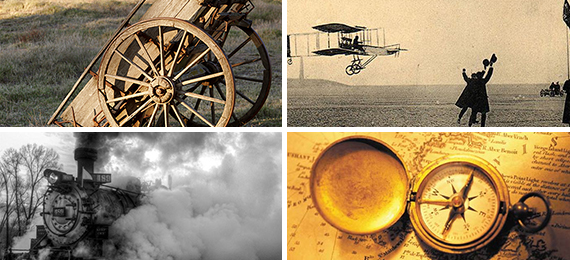
Humans are a genius species. From the wheel to the Internet, inventors introduced mind-blowing inventions that changed our lives. Nowadays, we can’t imagine a life without a mobile or the computer because inventions have been improving our daily lives. Several inventions were introduced that make our tasks easier, increase our knowledge of the world, and even can save our lives. From ancient equipment to modern digital advances, these inventions became the turning point in human history. Take our engaging quiz on ’10 Inventions that changed the World’ to expand your general knowledge.
10 Inventions That Changed the World
Inventions help man to advance in his life. These inventors and their ideas changed the world. We have clubbed the world-changing inventions. Let’s have a look.
When Was the Internet First Invented?
- A. The 1960s
- B. The 1980s
- C. The 1990s
- D. The 1920s
Wheel
The wheel is an original marvel of invention. It is known as a remarkable invention. Wheels made our lives easier to travel or transport things. The ancient wheel is known from Mesopotamia, approximately 3500 B.C ago. At that time, humans started building canals, making metal alloys, sailing ships, and complex musical instruments.
The light bulbs
Light bulbs are one of the most important inventions that help us do our work at night. As per historians, two dozen people were involved in making incandescent lamps in the 1800s. Thomas Edison is best known for inventing electric light bulbs. He is known for creating a functional lighting system that included wiring and generator and carbon-filament lamps in 1879.
Airplane
Can you imagine a life without flights? This list of important inventions would be incomplete without mentioning the Wright brothers and their flight. The Wights showed the airplane could fly with the control of a pilot that never had been invented earlier. It has changed everything from travel to shipping.
Steam Engine
Jerónimo de Ayanz, a Spanish mining administrator was the first person to develop the first steam engine. He created a device that could be used to steam power to move water from mines. However, Thomas Savery, an Englishman, is considered the father of steam engines for developing the first practical steam engine. His invention used to absorb water from flooded mines utilizing steam pressure. To develop this device, Savery used Denis Papin’s principles, who was a French-born British physicist and an inventor of the pressure cooker. In 1711, Thomas Newcomen introduced the engine with some improvements.
The printing press
The German Johannes Gutenberg was the creator of the printing press about 1440 AD in France. It is a mechanical device that uses ink to transfer text and images to paper. The printing press made books available to people and also contributed to the spread of knowledge and education in Europe.
Railways
We are enjoying long-distance travel today only because of the railways. They can carry large numbers of people and goods to long distances. It has even carried wagons since the 16th century. Richard Trevithick, a British engineer invented the world’s first full-scale working railway steam locomotive in 1804 in the United Kingdom. However, Trevithick’s locomotives were the heaviest to use on tracks. In the 1820s, the commercial appearance of the network was introduced. Later, George Stephenson was assigned to build the Stockton and Darlington Railway in the northeast of England, which opened in 1825. He invented his famous steam engine called Rocket in 1829.
Nails
A comfortable human life is not possible without the invention of nails. The origin of the bronze nails dates back to around 3400 BC in Egypt. From construction to carpentry, nails are the most essential tool in our lives.
Compass
The compass may have been invented for spiritual purposes. Later, it was widely used for navigational purposes. The ancient compass was invented by the Chinese around 200 BC. A magnetized needle was used by sailors, according to the European book written in 1190.
The Telephone
Alexander Graham Bell was awarded for inventing the electric telephone in 1876. He named his first telephone an “electrical speech machine,” according to PBS. The invention became famous and revolutionized globally especially for communication and business.
The Internet
At present, the internet is widely used by billions of people across the world. Did you know who invented the internet? Many people contributed to developing it. But one person who is often credited for his invention is the computer scientist Lawrence Roberts. A crew of computer scientists working for the US Defense Department’s Advanced Research Projects Agency (ARPA) invented a communication network to connect their computers to the agency. It is called ARPANET, which is a predecessor of the Internet.